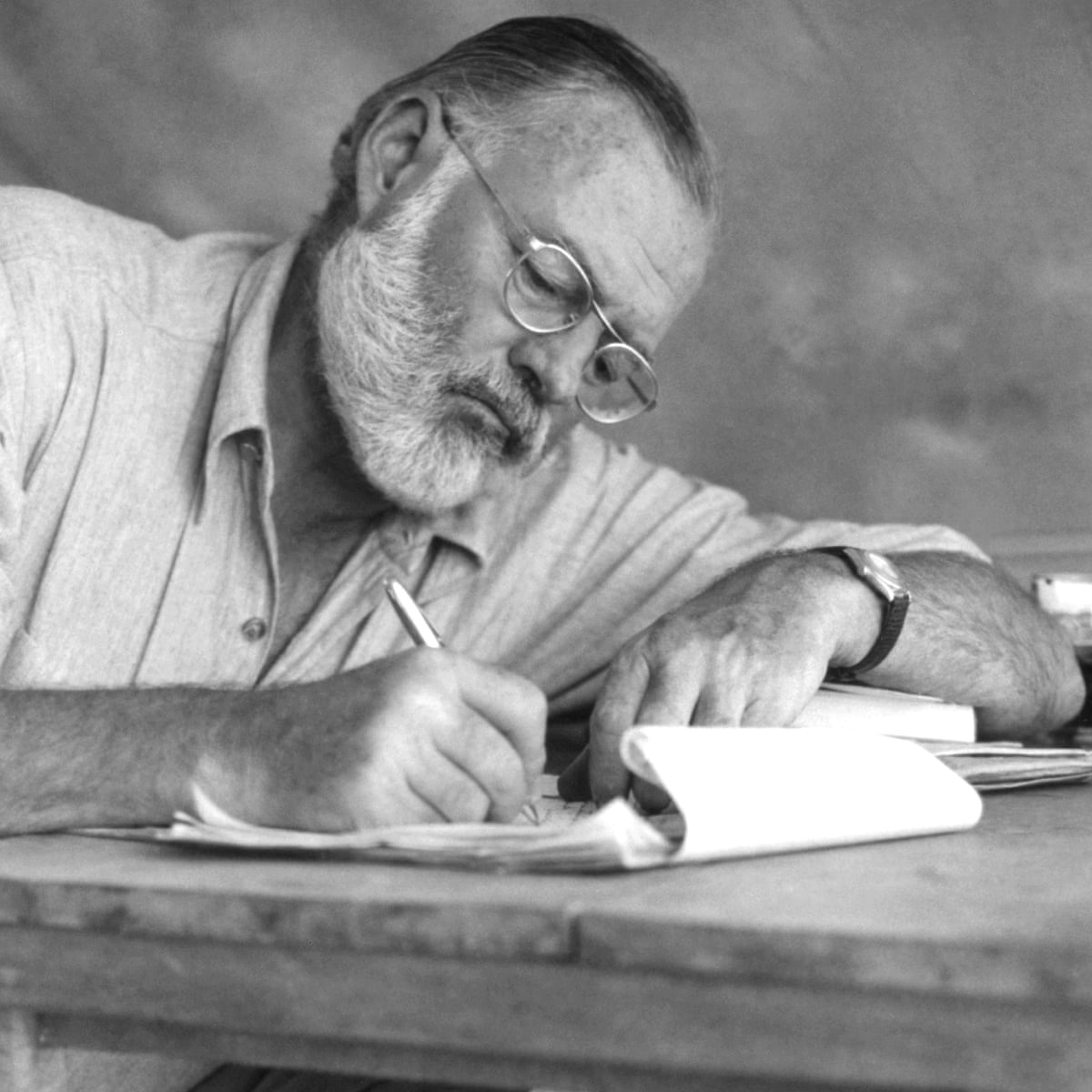Ernest Hemingway: The Literary Giant and His Enduring LegacyErnest Hemingway, often considered one
:max_bytes(150000):strip_icc()/ernest-hemingway-514896254-5c91ba79c9e77c0001e11e36.jpg) Ernest Hemingway, often considered one of the greatest American writers of the 20th century, left an indelible mark on literature with his distinctive style and exploration of themes such as war, love, masculinity, and existentialism. Born on July 21, 1899, in Oak Park, Illinois, Hemingway's life was as adventurous and complex as the characters he created in his novels and short stories.
Ernest Hemingway, often considered one of the greatest American writers of the 20th century, left an indelible mark on literature with his distinctive style and exploration of themes such as war, love, masculinity, and existentialism. Born on July 21, 1899, in Oak Park, Illinois, Hemingway's life was as adventurous and complex as the characters he created in his novels and short stories.
Hemingway's writing career began as a journalist for the Kansas City Star after he graduated from high school. His experiences as a reporter shaped his concise writing style, characterized by short sentences and a focus on action and dialogue. This style would become a hallmark of his later fiction. However, it was his time as an ambulance driver during World War I that deeply influenced his worldview and literary themes. Serving on the Italian front, Hemingway witnessed the horrors of war firsthand, an experience that would inform his writing for the rest of his life. His debut novel, "The Sun Also Rises" (1926), drew heavily from his experiences in post-war Europe, capturing the disillusionment and aimlessness of the Lost Generation.
However, it was his time as an ambulance driver during World War I that deeply influenced his worldview and literary themes. Serving on the Italian front, Hemingway witnessed the horrors of war firsthand, an experience that would inform his writing for the rest of his life. His debut novel, "The Sun Also Rises" (1926), drew heavily from his experiences in post-war Europe, capturing the disillusionment and aimlessness of the Lost Generation.
Hemingway's writing style evolved with each subsequent work, marked by his famous "iceberg theory" – the idea that the deeper meanings in his stories lay beneath the surface, much like the bulk of an iceberg hidden beneath the water. This minimalist approach to prose challenged readers to engage actively with his narratives, as they were often left to infer deeper meanings and emotions from the sparse dialogue and description. In 1952, Hemingway published one of his most celebrated works, "The Old Man and the Sea." The novella tells the story of an aging Cuban fisherman, Santiago, who struggles against nature to catch a giant marlin. Despite its brevity, the novel explores profound themes of endurance, resilience, and the struggle for meaning in a seemingly indifferent universe. It earned Hemingway the Pulitzer Prize for Fiction in 1953 and contributed to his Nobel Prize in Literature in 1954.
In 1952, Hemingway published one of his most celebrated works, "The Old Man and the Sea." The novella tells the story of an aging Cuban fisherman, Santiago, who struggles against nature to catch a giant marlin. Despite its brevity, the novel explores profound themes of endurance, resilience, and the struggle for meaning in a seemingly indifferent universe. It earned Hemingway the Pulitzer Prize for Fiction in 1953 and contributed to his Nobel Prize in Literature in 1954.
Beyond his literary achievements, Hemingway's personal life was marked by a series of tumultuous relationships and a lifelong battle with mental illness. His four marriages, including his marriage to fellow writer Martha Gellhorn, and his friendships with other literary luminaries such as F. Scott Fitzgerald and Gertrude Stein, were often as dramatic as the stories he wrote. Despite his success, Hemingway struggled with depression and alcoholism throughout his life. He sought solace in travel and adventure, spending time in Europe, Africa, and Cuba, where he became an avid big-game hunter and fisherman. These experiences provided fodder for his later works, including "A Moveable Feast" (1964), a memoir of his years as a struggling writer in Paris during the 1920s.
Despite his success, Hemingway struggled with depression and alcoholism throughout his life. He sought solace in travel and adventure, spending time in Europe, Africa, and Cuba, where he became an avid big-game hunter and fisherman. These experiences provided fodder for his later works, including "A Moveable Feast" (1964), a memoir of his years as a struggling writer in Paris during the 1920s.
Tragically, Hemingway's life ended in 1961 when he took his own life at the age of 61. His death shocked the literary world and left behind a legacy that continues to influence writers and readers to this day. Hemingway's works remain as relevant and compelling as ever, exploring timeless themes of love, loss, courage, and the human condition.
In conclusion, Ernest Hemingway's impact on literature is undeniable. His spare, economical prose revolutionized the way writers approached storytelling, while his exploration of universal themes continues to resonate with readers across generations. Despite his personal struggles, Hemingway's legacy endures, cementing his place as one of the greatest writers in American literary history. Hemingway's influence extends far beyond the realm of literature. He inspired generations of writers to embrace simplicity and honesty in their craft, encouraging them to strip away excess and focus on the essentials. His writing style has been studied and emulated by countless aspiring authors, and his works remain standard reading in classrooms and book clubs worldwide.
Hemingway's influence extends far beyond the realm of literature. He inspired generations of writers to embrace simplicity and honesty in their craft, encouraging them to strip away excess and focus on the essentials. His writing style has been studied and emulated by countless aspiring authors, and his works remain standard reading in classrooms and book clubs worldwide.
Moreover, Hemingway's adventurous spirit and larger-than-life persona captured the imagination of the public. He became a cultural icon, embodying the ideal of the rugged, macho man who lived life on his own terms. His image, with his trademark beard, fishing rod, and glass of whiskey, has been immortalized in countless photographs and biographies.
Yet, Hemingway's legacy is not without controversy. Critics have scrutinized his treatment of gender and race in his writing, pointing out instances of misogyny and racial stereotypes. Some have questioned his glorification of violence and machismo, arguing that it perpetuates harmful stereotypes of masculinity. Despite these criticisms, Hemingway's impact on literature and culture remains profound. His novels and short stories continue to be studied, analyzed, and celebrated for their depth, complexity, and enduring relevance. From the battlefields of war-torn Europe to the sun-drenched streets of Havana, Hemingway's writing transports readers to vividly imagined worlds, inviting them to grapple with life's most profound questions.
Despite these criticisms, Hemingway's impact on literature and culture remains profound. His novels and short stories continue to be studied, analyzed, and celebrated for their depth, complexity, and enduring relevance. From the battlefields of war-torn Europe to the sun-drenched streets of Havana, Hemingway's writing transports readers to vividly imagined worlds, inviting them to grapple with life's most profound questions.
Ernest Hemingway's legacy is as complex and multifaceted as the man himself. He was a literary giant whose influence extended far beyond the written page, shaping the way we think about art, identity, and the human experience. As we continue to wrestle with the complexities of his work and legacy, one thing remains clear: Hemingway's voice will echo through the corridors of literature for generations to come, reminding us of the power of storytelling to illuminate the darkest corners of the human soul. Hemingway's legacy is a testament to the enduring power of literature to capture the essence of the human experience. His ability to distill complex emotions and existential dilemmas into simple, poignant prose resonates with readers of all backgrounds and generations. Whether exploring the futility of war, the fleeting nature of love, or the search for meaning in a chaotic world, Hemingway's writing speaks to the universal truths that bind us all together. As we reflect on his life and work, we are reminded of the profound impact that a single voice can have on the course of history and the hearts of humanity. Ernest Hemingway may have left this world, but his words live on, continuing to inspire, challenge, and provoke thought long after his passing.
Hemingway's legacy is a testament to the enduring power of literature to capture the essence of the human experience. His ability to distill complex emotions and existential dilemmas into simple, poignant prose resonates with readers of all backgrounds and generations. Whether exploring the futility of war, the fleeting nature of love, or the search for meaning in a chaotic world, Hemingway's writing speaks to the universal truths that bind us all together. As we reflect on his life and work, we are reminded of the profound impact that a single voice can have on the course of history and the hearts of humanity. Ernest Hemingway may have left this world, but his words live on, continuing to inspire, challenge, and provoke thought long after his passing.



















































